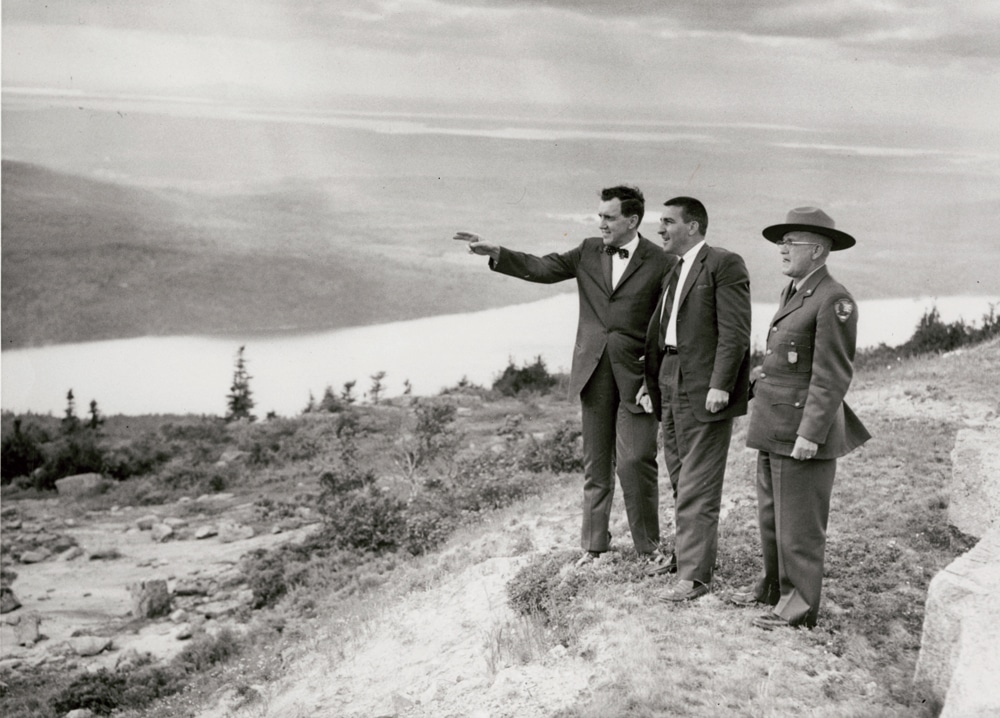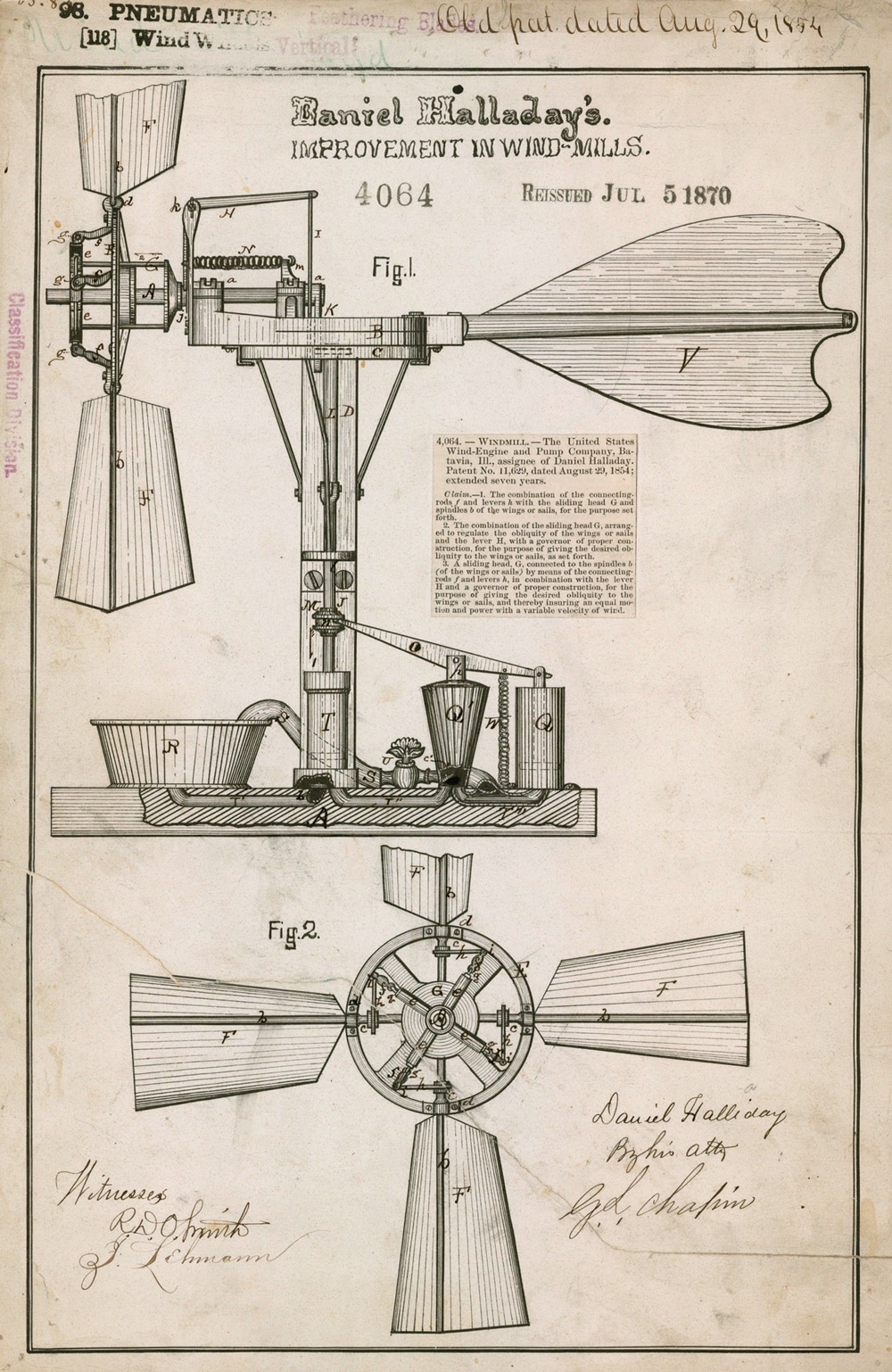Green Milestones | Our Land, Our Sea, Our Future
1836 Boston native Ralph Waldo Emerson publishes the essay “Nature,” which—in laying out the fundamentals of the philosophical movement he cofounded, Transcendentalism—describes the benefits of nature on the human soul. 1854 Inspired by his experience of building and living in a cabin in the woods outside Concord, MA, Henry […]

1958:
Former Maine governor Edmund Muskie is elected to the U.S. Senate,
where he becomes one of the nation’s most dynamic environmental leaders. Among his enduring accomplishments: helping to secure passage of the
Clean Air Act of 1970 and the Clean Water Act of 1971.
Above: Senator Muskie (left) in Maine’s Acadia National Park in the early 1960s with Interior Secretary Stewart Udall and an unidentified park ranger.
Photo Credit : The Edmund S. Muskie Archives and Special Collections Library1836
Boston native Ralph Waldo Emerson publishes the essay “Nature,” which—in laying out the fundamentals of the philosophical movement he cofounded, Transcendentalism—describes the benefits of nature on the human soul.
1854
Inspired by his experience of building and living in a cabin in the woods outside Concord, MA, Henry David Thoreau publishes Walden, one of the first mainstream environmental works.

Connecticut machinist Daniel Halladay patents the first commercially viable American windmill, which, unlike traditional European windmills, has an innovative vane that automatically keeps it pointed into the wind.
Photo Credit : National Archives
1869
Frederick Billings buys the former Woodstock, VT, estate of George Perkins Marsh and lays the groundwork for what will become the oldest managed forest in the U.S., now part of Marsh-Billings-Rockefeller National Historical Park.
1876
The Appalachian Mountain Club is founded in Boston by MIT physicist Edward Pickering to explore and preserve the White Mountains of New Hampshire. Today the nation’s oldest conservation and recreation group, it boasts more than 100,000 members.
1883
Boston-born inventor Charles Fritts develops the first photovoltaic cell—a device that converts solar energy into electricity—using selenium wafers coated with gold. This leads to the world’s first solar array being installed a year later on a New York City roof.
1890
Boston landscape architect Charles Eliot, a Frederick Law Olmsted protégé, proposes a statewide nonprofit to preserve land for all to enjoy “just as a public library holds books and an art museum holds pictures.” The following spring the Massachusetts legislature establishes the Trustees of Reservations, which is now the oldest regional land trust in the world and owns 116 properties on 27,000 acres.
1896
After leading a boycott of feathered hats among their fellow Boston socialites, Harriet Hemenway and Minna Hall organize the Massachusetts Audubon Society, a precursor to the national society that would form in 1905.
1901
Alarmed by clear-cutting in the White Mountains, a handful of private citizens form the Society for the Protection of New Hampshire Forests. In its first century, this conservation nonprofit protects over 1 million acres of woodlands.
1905
Connecticut’s Gifford Pinchot, a forester and politician who coined the term “conservation ethic,” becomes the first U.S. Forest Service chief.
1911
Introduced by Rep. John Weeks of Massachusetts, the Weeks Act becomes law. It allows federal money to be used to purchase forest land for conservation.
1919
The first national park in the eastern U.S., Lafayette National Park, is created on Mount Desert Island in Maine. It will be renamed Acadia in 1929.
1930
Former Maine governor Percival Baxter buys the first of many land parcels he will donate to the state, eventually forming the 200,000-plus acres of Baxter State Park, on the condition it be kept “forever wild.”
1930
Massachusetts’s Woods Hole Oceanographic Institution is established; it grows to become the largest independent oceanographic research institution in the country.
1939
“Solar I,” a small, one-story wooden structure on Vassar Street in Cambridge, MA, becomes the first U.S. house to be heated with the sun’s energy. It is the first of six solar houses designed and built by MIT faculty between 1939 and 1978.
1941
In Castleton, VT, the Smith-Putnam Wind Turbine becomes the first-ever wind machine to feed power to a U.S. electric grid. Standing 120 feet tall and fitted with two 66-foot blades, the turbine is capable of producing 1.5 megawatts; not until 1979 would a bigger wind turbine be erected.
1944
In a bid to help landowners conserve and manage their forests, the New England Forestry Foundation is established. Thanks to this Littleton, MA–based nonprofit, more than 1.1 million acres of forest—roughly a third of all land conserved in New England since 1999—have been protected to date.
1957
Future Shaftsbury, VT, resident Elizabeth Titus Putnam founds the Student Conservation Association to give young people service opportunities in U.S. national parks. Today nearly 4,000 high school, college, and graduate students give service on public lands via SCA.

Former Maine governor Edmund Muskie is elected to the U.S. Senate, where he becomes one of the nation’s most dynamic environmental leaders. Among his enduring accomplishments: helping to secure passage of the Clean Air Act of 1970 and the Clean Water Act of 1971.
Above: Senator Muskie (left) in Maine’s Acadia National Park in the early 1960s with Interior Secretary Stewart Udall and an unidentified park ranger.
Photo Credit : The Edmund S. Muskie Archives and Special Collections Library
1961
President John F. Kennedy creates the Cape Cod National Seashore—not only conserving more than 43,000 acres of beaches, marshes, and woods but also marking the first time the federal government created a national park from land that was primarily in private hands.
1962
Part-time Maine resident Rachel Carson publishes Silent Spring, which becomes an international best-seller and a literary landmark in the modern environmental movement.
1965
Vermont’s Middlebury College becomes the first U.S. undergraduate institution to offer a degree in environmental studies.
1966
The Conservation Law Foundation is founded in Boston. On its way to becoming one of the country’s leading environmental advocates, it will file a pivotal 1983 lawsuit in forcing the decades-long, $4.5 billion cleanup of Boston Harbor.
1970
The land conservation organization Maine Coast Heritage Trust is launched. Among its achievements: protecting more than 121,000 acres, including 260-plus islands, and raising $100 million in the largest land conservation capital campaign in Maine’s history.
1971
Springfield, MA’s own Dr. Seuss (Theodor Seuss Geisel) publishes The Lorax, one of the first children’s books to directly address environmental concerns. (“Unless someone like you cares a whole awful lot, nothing is going to get better. It’s not.”)

Decades after the puffin had all but disappeared from Maine, the National Audubon Society launches Project Puffin to help restore the birds to their historic nesting islands in the Gulf of Maine. Today, these islands are nesting ground for more than 6,000 pairs of puffins.
1981
As part of a federal pilot program, an array of more than 300 solar panels is installed at Beverly (MA)High School, making it one of the largest solar sites in the nation and the only one powering a school. It is still operating today.
1989
Massachusetts native Bill McKibben publishes The End of Nature, the first popular nonfiction book on the dangers of climate change.
1993
Connecticut becomes the first state in the nation to develop and implement an “environmental justice” program, designed to ensure that all citizens have the same access to natural resources and face the same burden of environmental health hazards.
2002
Thanks in part to efforts by the New Hampshire Wild Flower Society and the Appalachian Mountain Club, the Robbins’ cinquefoil—a yellow alpine flower found exclusively in the White Mountains—rebounds from near extinction and becomes the first plant species to fully recover and be removed from Endangered Species Act protection.
2012
A U.S. Forest Service study ranks New Hampshire, Maine, and Vermont first (88.9%), second (83.1%), and third (81.5%), respectively, for most tree cover by percentage of total land among U.S. states.
2014
Williamstown, MA, author Elizabeth Kolbert publishes The Sixth Extinction, which argues that humans’ disruption of natural systems is putting our own survival at risk. The book goes on to win the Pulitzer Prize for general nonfiction.
2014
Montpelier, VT, launches its initiative to become the first state capital in the nation to go “net zero”—getting all of its energy from renewable sources—by the year 2030.
2015
As the result of a successful public-private conservation effort begun in 2008, the native New England cottontail—which had seen its habitat decrease by nearly 90 percent since the 1960s—is removed from consideration for Endangered Species Act protection.
2016
The first offshore wind farm in North America, the five-turbine Block Island Wind Farm, begins generating power off the Rhode Island coast.
2017
Joining smaller New England cities such as Newport, RI, and Brattleboro, VT, the Boston City Council votes to ban single-use plastic bags at checkout counters. Over 350 million such bags are estimated to be used in Boston every year.


